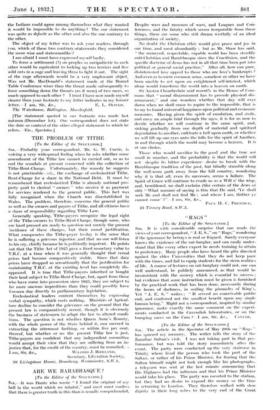THE PROBLEM OF TITHE [To the Editor of the Srm-raion.]
Sin, —Probably your correspondent, Mr. G. W. Currie, is voicing a very widespread feeling when he asks whether some amendment of the Tithe law cannot be carried out, so as to end the scandals at present connected with the collection of Tithe-Rent-Charge. Unfortunately, the remedy he suggests is not practicable—riz., the exchange of ecclesiastical Tithe- Rent-Charge for a share in the National Debt. It must be remembered that ecclesiastical Tithe is already national pro- perty paid to clerical " owners who receive it as payment for services rendered to the general public. This fact was fully recognized when the Church was disestablished in Wales. The problem, therefore. concerns the general public as well as the owners and payers of Tithe, and all citizens have a share of responsibility regarding Tithe Law.
Generally speaking, Tithe-payers recognize the legal right of the Tithe-owners to Tithe-Rent-Charge, though some. who are hard pressed are ready to question not merely the present incidence of these charges, but their moral justification. What exasperates the Tithe-payer to-day is the sense that he is suffering a grievous injustice. and that no one will listen to his cry, chiefly because he is politically impotent. He points out that the Tithe Act of 1925 gave a fixed monetary value to T.R.C. at a time when it was generally thought that cereal prices had become comparatively stable. Since that date prices have dropped so sensationally that the justification for maintaining T.R.C. at the existing level has completely dis- appeared. It is true that Tithe-payers inherited or bought their land subject to Tithe-Rent-Charge, hut, apart from those who have conic into possession since 1925, they are subject to far more onerous impositions than they could possibly have iiireseen due directly to parliamentary legislation.
Ecclesiastical leaders content themselves by expressing verbal sympathy, which costs nothing. Ministers of Agricul- ture decline to consider the grievance on the ground that the present law is comparatively recent, though it is obviously the business of statesmen to adapt the law to altered condi- tions. The question is not whether Queen Anne's Bounty, with the whole power of the State behind it, can succeed in extracting the uttermost farthing, or within five per cent. thereof, but whether or no the present Tithe law is just. Tithe-payers are confident that any independent committee would accept their view that they are suffering from an in- justice that, for the credit of the country, must be remedied-- Secretary, Liberation Society.
89 Livingstone House, Broadway, Westminster,




































 Previous page
Previous page